ALINA BESKROVNA’S STORY, AS TOLD TO CHRISTINA PERRIER
Alina Beskrovna, ‘17G, spoke to The Brown and White about her experience in the Russo-Ukrainian War. Beskrovna was in Mariupol, Ukraine, when she woke up to attacks in her home city on Feb. 24. She and her mom took refuge in her friend’s dark, 35-degree basement with 30 other people, including six children, for 30 days. They were completely cut off from the outside world for two and a half weeks starting Feb. 28.
Beskrovna, her mother and four others decided to escape Mariupol on March 23 by car. They drove for over 14 hours and passed 16 Russian checkpoints to get out of the city. After a few more days of staying in refugee apartments and getting rides from volunteers, they crossed the border to Poland by foot on March 28. There, they stayed in a refugee camp and then got picked up by a friend who drove her and her mom for over four days to Copenhagen, Denmark, where she is now.
Below is a more detailed recollection of what happened through Alina’s viewpoint.
THE NIGHT OF FEB. 23
The night before, I was out. I work full time as a startup development specialist, so I had an office to go to and I was also helping some foreign journalists as a translator. I was out at a sushi restaurant downtown with them and then I dropped them off at their hotel. I came back home kind of late, around 11 p.m., managed to squeeze in one interview with 6abc and called it a night.
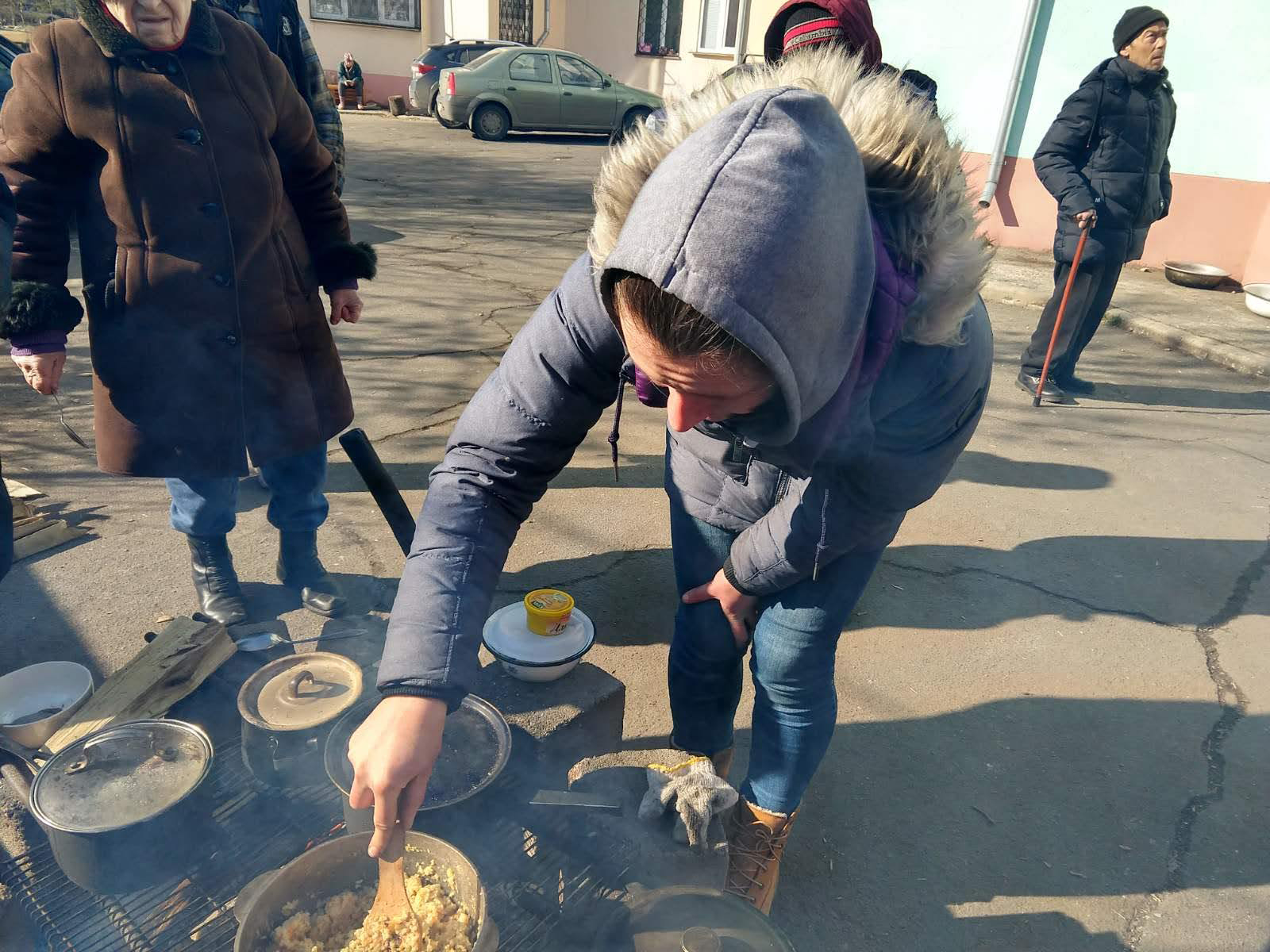
Alina Beskrovna stirs rice over an open fire surrounded by her basement neighbors. Beskrovna and her mother took refuge in the basement for 30 days before escaping to Poland. (Courtesy of Alina Beskrovna)
THE MORNING OF FEB. 24:
Around 6:20 a.m., I woke up from a blast that felt like you’re watching an action movie at the theater, like Dunkirk, and you’re sitting very close to the speaker. For a second there, I was hoping that one of my neighbors was leaving for work and slammed the metal garage door without thinking of others.
Then I suspected something was weird — something was wrong. I went on Facebook and I scrolled down my newsfeed.I just couldn’t believe my eyes. Ukraine was being bombed from every direction you could think of, all at once, from 4 a.m. to 6 a.m. That’s how I knew it was outright war.
It’s very hard to let it sink in. No one thought the level of destruction would be this brutal. No one expected something like this – this brutal, genocidal type of war took us all by surprise.
“It’s very hard to let it sink in. No one thought the level of destruction would be this brutal. No one expected something like this – this brutal, genocidal type of war took us all by surprise.”
I jumped right into problem-solving mode: things like, ‘we have three cats and they don’t have carriers, so what can we use?’ went through my mind. We ended up using beach bags. My dad lived on the other side of town. ‘What do I do about him? How do we make sure we don’t lose each other?’ I don’t have a car, so I had to become dependent on others. Then, I had to decide between leaving and staying at home. We lived in a five story building that has a basement, but it’s impossible to live in that basement because it’s dirty and humid, you can’t stand up right, there’s no place to sit let alone lay down.
I woke up my mom and I called my family friend and asked him if he could come pick us up and let us stay in his basement on the other side of town — because you could stand upright and it was dry. He came to pick us up and we never went back home.
THE BASEMENT: FEB 24 – MARCH 23
Now that I see what they’ve done downtown, and to my apartment building in particular, I realized it was just by sheer luck that my decision making process ended up being the correct one.
When we were in the basement, there were times where we didn’t sleep for two or three days at a time because of the constant shelling and bombing. And then, you don’t know when your next meal is coming — survival instinct kicks in and you’re constantly hungry because you have very limited resources. We didn’t have a chance to shower or wash our hair for a month.
It’s very ugly on the inside. People are very irritable. On the surface, everyone tries to be nice and helpful, but if you dig deeper it’s not so pretty because of the stress levels. People snap at each other, you’re under constant sleep deprivation, everybody’s afraid for their loved ones’ lives, no one knows what’s coming next.
The Russians were wiping out the city and they are just on a mission to just kill. There’s constant shelling, there’s tank movements all around you and then they resorted to airstrikes that no basement will survive. We witnessed the shelling of residential areas right in front of our eyes.
You can be hiding in the basement, refusing to go out for weeks on end, and then it takes one trip to boil some water for tea or go use the outhouse and you’re killed right then and there. You can’t control life anymore.
The Russians bombed the maternity hospital I was born in with women and newborns there. Then they bombed the drama theater downtown, which was the symbol of the city, but also the biggest shelter for civilians. There was a huge ‘children’ written in white, right on the square in front of the drama theater, so that the Russians would see it from space and they just didn’t care. There were over 1,000 civilians hiding there and over 300 were killed instantly on that day.
We would try to catch radio stations, and we found that there were no Ukrainian radio stations to catch anymore. Instead, you could listen to the stations from the so-called “Donetsk People’s Republics.” What we heard was insane, mind-boggling propaganda. That’s how we got information for the next two weeks.
But also, we had neighbors from our basement or neighboring basements drive downtown or to the other parts of town when the shelling was not that active to check up on their relatives. They would try to get to elevated spots where you could get some cell phone connection to make a call to find out what’s actually going on in Ukraine and they would bring back news.
Someone would bring back their relatives, and I would be afraid to ask what they saw because of the look in their eyes and the emotional breakdowns.
One guy brought his entire family from the other side of town and said that a missile landed in between the first and second floor as he was pulling up — his relatives lived on the first floor. He dragged them out, put them physically in the car, threw in whatever they could, all under intense shelling and not understanding what was going on, because the adrenaline kicked in. Once they got to the basement on the other side of town, it took him about three days to come back to reality. He couldn’t understand how he was alive because with the conditions that he was thrown in, he was not supposed to make it through.
The longer you waited to escape, the more dangerous it became because Russian forces were approaching rapidly. You either escaped fast and drove to Western Ukraine, which I couldn’t do because I didn’t have a car, or you could take the last evacuation train on Feb. 26 or 27, which I didn’t even know about.
My family friend with the car did not want to get out the first three days because he was under the false impression that it was still safe. He thought nothing significant was happening, so why abandon his apartment, his garage, his work?
Because of him we stayed and then it was just impossible to get out. The city was besieged and there was intense fighting all over the place. There was just no physical ability to drive out.
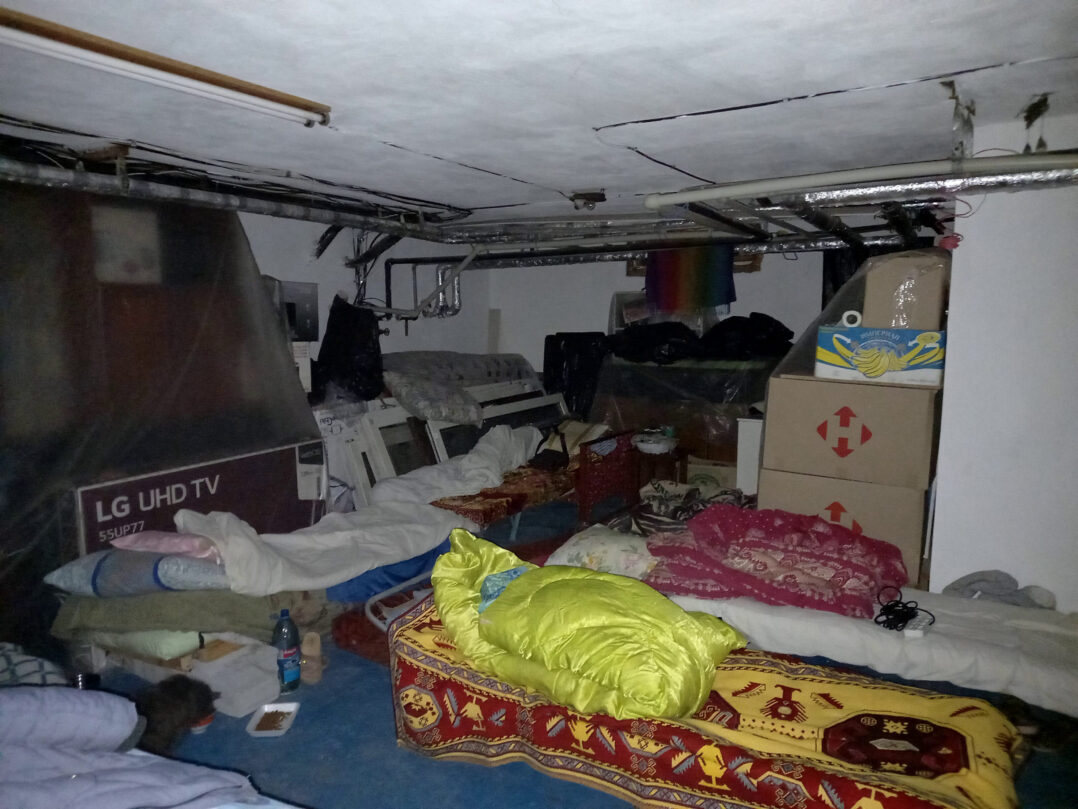
There were 32 people in the basement taking refuge, including six children. Alina and her mother ate and slept in the basement for a total of 30 days. (Courtesy of Alina Beskrovna)
LEAVING: MARCH 23
As soon as the Russians established control alongside the Azov Sea, they allowed civilians out, but you had to be in your own private vehicles, you had to still have fuel in your car and you had to be ready to be strip searched at each checkpoint – they checked all of your pictures, your WhatsApp, your messengers, your contacts to see if you’re a ‘Ukrainian Nazi.’ By that, they mean anything that can signify you’re not happy about what Russians are doing.
I knew of some instances of the driver making it all the way to the Ukrainian control territory but his wife being shot and killed right next to him in the passenger seat. There were no proper humanitarian corridors.
If you wanted to try to escape, you had to have those conditions fulfilled and be ready to be killed on your way.
“If you wanted to try to escape, you had to have those conditions fulfilled and be ready to be killed on your way.”
As soon as we heard it was possible to leave, it took a couple more days of realizing how bad the situation was and convincing my family friend that we needed to go.
It took us from 7 a.m. on March 23 to 9:30 p.m. the same day to get over 16 Russian checkpoints and actually make it into the city of Zaporizhzhya. That was the most life threatening, risk taking, intimidating leg of the journey.
BACK TO FEB 26:
I don’t know where my father is. He didn’t take the situation seriously. He kept laughing it off. The last call I got from him was on February 26 when he said, ‘It’s fine, nothing is going on. I have a good basement and I have good neighbors. My plan is to stay put unless something starts unfolding.’
I told him, ‘We’re thinking of evacuating, would you come with us?’ And he said, ‘No way. I’m not abandoning my home.’
He’s either not alive anymore or he might be going through forced deportation to Russia. If he’s in the process of being deported to Russia, I have no idea how to get him out at this point. I think of him every day. Every single day.
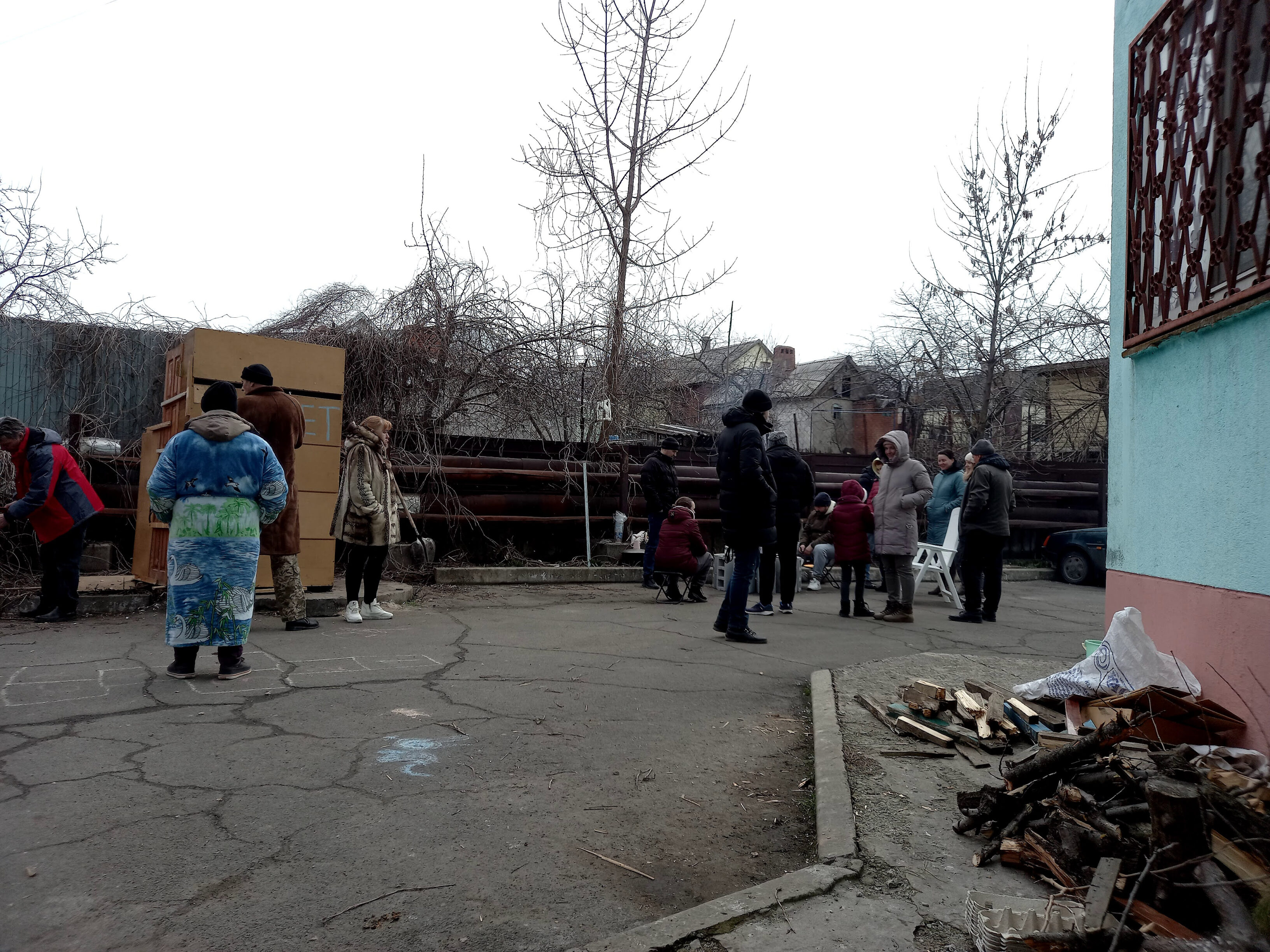
Alina Beskrovna’s basement neighbors stand around the open fire pit near the outhouse. There were 32 refugees living in the basement, including six children. (Courtesy of Alina Beskrovna)
REFLECTIONS:
War does not care. What’s your background? Are you well traveled? Do you have an American MBA? How much were you making a week ago? It throws people from very different walks of life in the same conditions. Those conditions are not just irritating or unfair, they also really hurt your human dignity. To find yourself in a condition like that is not something humans should experience.
“War does not care. What’s your background? Are you well traveled? Do you have an American MBA? How much were you making a week ago? It throws people from very different walks of life in the same conditions. Those conditions are not just irritating or unfair, they also really hurt your human dignity. To find yourself in a condition like that is not something humans should experience.”
I’m just like you. I walked the steps to Rauch Business Center a thousand times, I’ve been to Taylor Gym, I had Chinese at the UC. I’m just like you, which goes to show how indiscriminate evil is. It’s not somewhere far away. It’s very close to home and it can happen to anyone.
We are just lucky as Ukrainians because we’re a highly educated nation and well traveled. We are lucky in the sense that we’re perceived as European because we are from Europe, we are White, we are Christian. We are empathized with much more than other nations. We’re not the first ones to go through this — Syrians, for example, they are not given that level of empathy and support as we are being given right now.
If it’s remote, it feels like there’s nothing you can do, which is not the case. American students have governmental representatives and can therefore influence the legislature, which in turn influences real people like me. It’s very important to stay educated and not feel like you’re powerless in watching this genocide take place.
Just sharing information and bringing awareness to campus can help. You can help by calling your Congress people and demanding certain actions to be taken. You can cut all purchases of oil and gas from Russia, which goes directly into financing the missiles that kill us.
Because you are privileged to live in a peaceful country, then joining any type of initiative, or even starting up your own, can go a long way. You don’t have to be physically in Ukraine to help people right now.
“Because you are privileged to live in a peaceful country, then joining any type of initiative, or even starting up your own, can go a long way. You don’t have to be physically in Ukraine to help people right now.”
I don’t blame people who decide to stay away from it, but I do think that by staying neutral, you’re siding with evil.

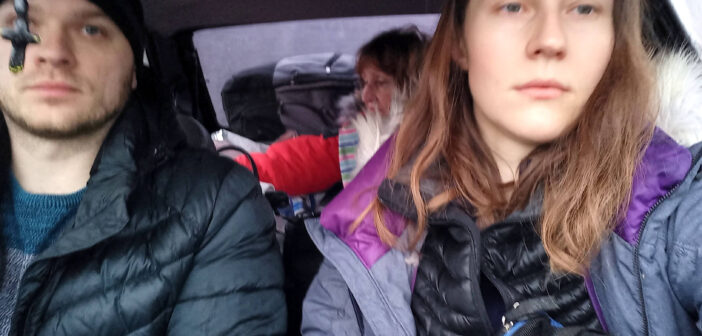

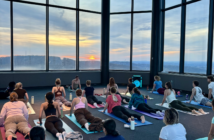


Comment policy
Comments posted to The Brown and White website are reviewed by a moderator before being approved. Incendiary speech or harassing language, including comments targeted at individuals, may be deemed unacceptable and not published. Spam and other soliciting will also be declined.
The Brown and White also reserves the right to not publish entirely anonymous comments.
1 Comment
Bless you and your family Alina! Moving article, Lehigh!